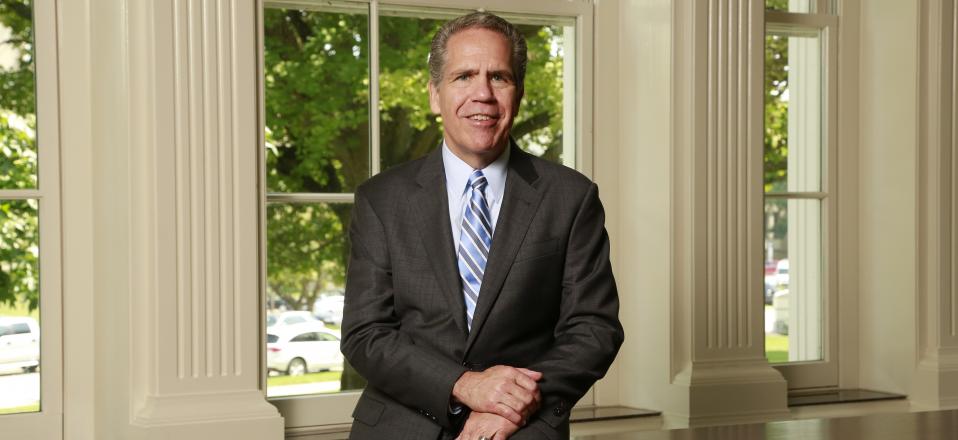Danko signed a letter with 24 other community leaders addressed to Indiana legislators, urging for a comprehensive hate crimes law. Photo courtesy of Butler’s website.
JESSICA LEE | NEWS EDITOR | jelee2@butler.edu
On Feb. 28, Butler President James Danko released a statement regarding an Indiana Senate Bill on hate crimes.
The statement said the recently passed bill was “unjust, and therefore, unacceptable.” Danko also signed a letter with 24 other community leaders — including the chairman and CEO of Eli Lilly and Company, the owner of the Indianapolis Colts and the President and CEO of United Way of Central Indiana — addressed to Indiana legislative leaders, urging for a comprehensive hate crimes law.
“The sense of inclusivity is something that has been in our values and our DNA going back to 1855,” Danko said. “I have an obligation in my mind to stand up when you see something like that that conflicts with our values.”
The bill originally included protections for crime victims who are targeted for their race, religion, sexual orientation and other traits. The Senate amended the bill to remove the classes listed above and instead stated that courts can consider general bias when implementing a criminal sentence.
Indiana is one of five states without a hate crimes law. The other states are Arkansas, Georgia, South Carolina and Wyoming.
Greg Shufeldt, assistant professor of political science, said those who refuse to identify specific groups argue that it gives judges more latitude in what could be considered a hate crime or not — although “it is suspect that that is a sincerely held belief.”
“Opponents of hate crime legislation use tactics like this because general opposition to hate crime language is politically an unattainable position and it’s a very unpopular decision,” Shufeldt said.
Danko said students should step in when something contradicts Butler University’s values.
“If you became a part of the Butler community and you decided to come here, you should have done your homework,” Danko said. “You signed up for this. You signed up for our values. From my opinion, it’s that students should defend and represent our values and our mission.”
Danko urged students to intervene, as he asked them to pledge to do during convocation at the start of the school year.
Hussein Mohamed, a senior biology and English double major, said he supports Danko’s statement and his signing of the letter.
“I’m happy that at least he’s moving forward with that and being proactive in that sense,” Mohamed said. “But I would be a lot happier if we saw more of that same level of proactiveness on campus.”
This was not the first time Danko made a statement regarding issues outside of campus. In 2015, he issued a statement on Indiana’s Religious Freedom Reform Act and another in 2017 concerning immigration.
Shufeldt said because Danko does not speak on every piece of legislation, “it communicates a level of gravitas and importance” when he does.
“This issue transcends left and right, Democrat and Republican,” Shufeldt said, pointing out that many different universities in Indiana signed a letter supporting a hate crime law in August.
The list included University of Notre Dame, Saint Mary’s College and Indiana University.
“He’s not necessarily telling us how to vote on every issue… but in his capacity as president of Butler University, this is an issue that warranted his stepping up,” Shufeldt said. “I think that communicates something above and beyond whether you support or oppose the legislation.”
When considering whether to publicly take a stance on an issue, Danko said he takes time to reflect. He asks himself how to best represent Butler, which is multi-faceted considering its students, faculty and staff, alumni and other stakeholders.
He said historically, universities have a belief that they’re “above the fray” as a “more intellectual mediator of dialogue” instead of having a self-interest in profits or products.
“Being a president of a university allows you to perhaps go forward with some sort of stature that you’re representing an unbiased kind of fact-educated belief about certain things,” Danko said. “To me, that’s why universities should, occasionally, come out and take positions.”



